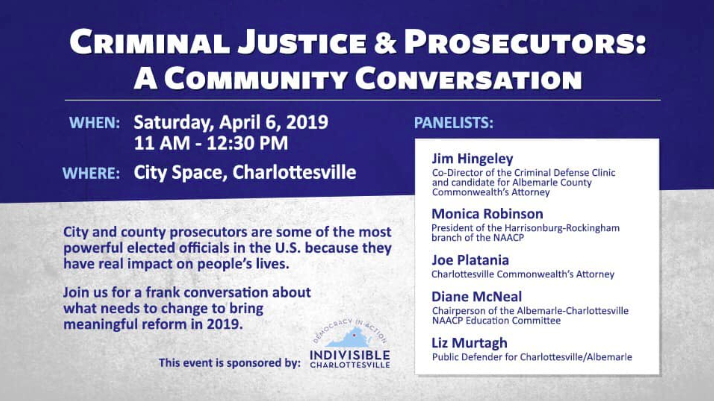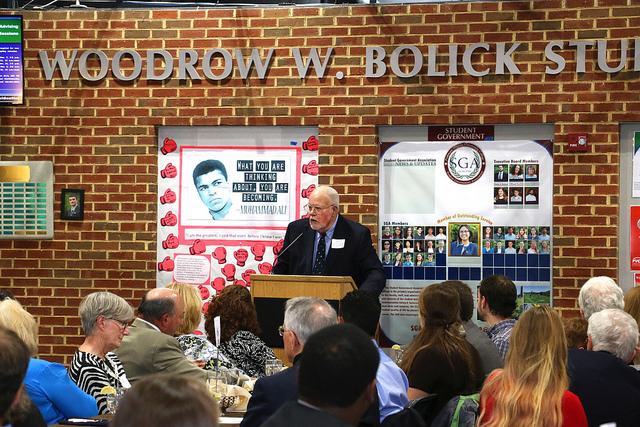
Changing the Way Prosecutors Prosecute
Teddie Frock, staff writer
On April 6, Indivisible Charlottesville hosted a panel of law enforcement professionals to discuss the power of prosecutors and focus on ways of eliminating mass incarceration and diversion of children away from the criminal
justice system.
Indivisible, a group formed in the aftermath of the 2016 election, supports localities in taking actions to teach and implement Civic education regarding Federal and State legislative issues. They also support voter registration and endorse candidates for office.
The panel included Joe Platania, Charlottesville’s commonwealth attorney; Liz Murtagh, public attorney for Charlottesville and Albemarle; Jim Hingeley, co-director of the Criminal Defense Clinic; Monica Robinson, president of the Harrisonburg-Rockingham branch of the NAACP; and Diane McNeel, chairperson of the NAACP education committee, Charlottesville, Albemarle.
Prosecutors have tremendous influence regarding cases in the criminal justice system. They have the power to decide if charged
individuals will be taken to court. It is the job of the defense attorney to communicate with the Commonwealth Attorney about the person who is charged and what the circumstances are in each case. This approach helps them to see defendants not just as a perpetrator or criminal, but as a person. Platania said, “Just because we have a hammer, not everything is a nail.”
Juvenile offenders and those with mental health and substance abuse issues can be diverted away from incarceration to programs that help them address underlying issues. The court can give offenders the opportunity to participate in the programs as an alternative to going to jail, or in some cases, to eliminate having a criminal record that will follow them throughout their lives.
Drug court is a rehabilitative and behavioral program available to those with substance abuse issues. Clients are followed and held accountable by the court for the period of time needed to recover and embark on a productive path. The mental health docket allows people with mental health or psychiatric issues to work with health professionals to treat and manage underlying issues. Clients can receive the support to make positive healthy changes, and at the same time, receive treatment. Some juvenile courts have programs that reach out to schools and work with them to find ways to not bring children into the system.
The panelists and audience discussed issues of disparity in the system that contributes to arrests and incarceration of minorities and children. Platania was questioned about the need to hire African-American students to work in the Commonwealth Attorney office. is office has initiated an internship program for African-American students.
The panelists encouraged citizens to influence prosecutors to work on changing laws that do more harm than good to communities, such as mandatory minimum sentence guidelines and discriminatory mass incarceration. Panelists also encouraged parental and citizen involvement with children in schools, as a way to help young people to grow up to be productive and successful adults.
Plantania’s efforts include the implementation of a mental health treatment court as an alternative to incarceration. He has also introduced the concept of community prosecution. Community prosecution involves using the prosecutor’s office to solve problems, improve public safety and the lives of citizens.
According to Platania on his role as prosecutor, “You’re there to develop relationships, I am a big believer in relationships and pre-existing relationships as a way to solve problems.”







